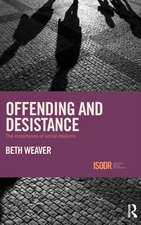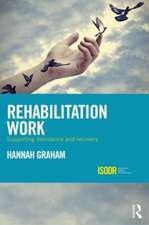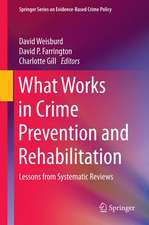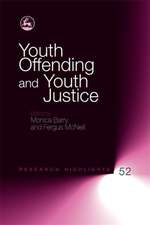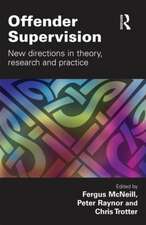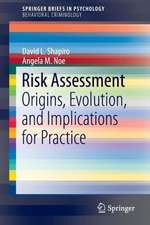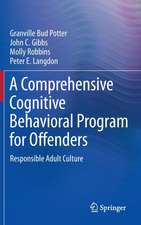Probation: 12 Essential Questions
Editat de Fergus McNeill, Ioan Durnescu, René Butteren Limba Engleză Paperback – 4 noi 2016
| Toate formatele și edițiile | Preț | Express |
|---|---|---|
| Paperback (1) | 385.25 lei 6-8 săpt. | |
| Palgrave Macmillan UK – 4 noi 2016 | 385.25 lei 6-8 săpt. | |
| Hardback (1) | 390.63 lei 6-8 săpt. | |
| Palgrave Macmillan UK – 5 iul 2016 | 390.63 lei 6-8 săpt. |
Preț: 385.25 lei
Nou
73.71€ • 76.97$ • 60.87£
Carte tipărită la comandă
Livrare economică 15-29 aprilie
Specificații
ISBN-10: 1137519819
Pagini: 287
Ilustrații: IX, 281 p.
Dimensiuni: 148 x 210 x 15 mm
Greutate: 0.35 kg
Ediția:1st ed. 2016
Editura: Palgrave Macmillan UK
Colecția Palgrave Macmillan
Locul publicării:London, United Kingdom
Cuprins
Recenzii
Notă biografică
Textul de pe ultima copertă
This volume poses a series of key questions about the practice of probation as an integral part of the European criminal justice system. The contributors are established experts in their respective fields of study and together their questions address the legitimacy, and perhaps continued existence, of probation.
The book includes analysis of why people offend and stop offending, and the wide ranging impacts of probation. This includes the impact on offenders' social reintegration, as a form of reparation for victims and communities, on public desire for justice and punishment, and on probationers themselves. The contributors further assess the state of probation and its adaptation to the current state of penality and society, the role of probation officers in pre-sentencing decision-making and the promotion of community sanctions and measures. By providing important recommendations and suggestions for application to practice, the book will be of great interest to academics, policy makers and practitioners alike.
Descriere
This volume poses a series of key questions about the practice of probation as an integral part of the European criminal justice system. The contributors are established experts in their respective fields of study and together their questions address the legitimacy, and perhaps continued existence, of probation.
The book offers analyses of why people offend and stop offending, and the wide ranging impacts of probation. This includes the impact on offenders' social reintegration, as a form of reparation for victims and communities, on public desire for justice and punishment, and on probationers themselves. The contributors further assess the state of probation and its adaptation to the current state of penality and society, the role of probation officers in pre-sentencing decision-making and the promotion of community sanctions and measures. By providing important recommendations and suggestions for application to practice, the book will be of great interest to academics, students, policy makers and practitioners alike.






